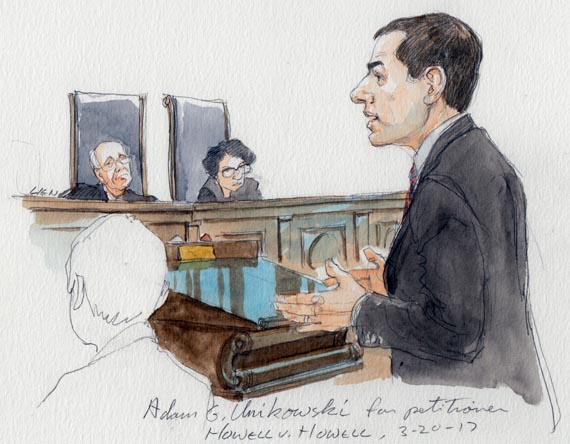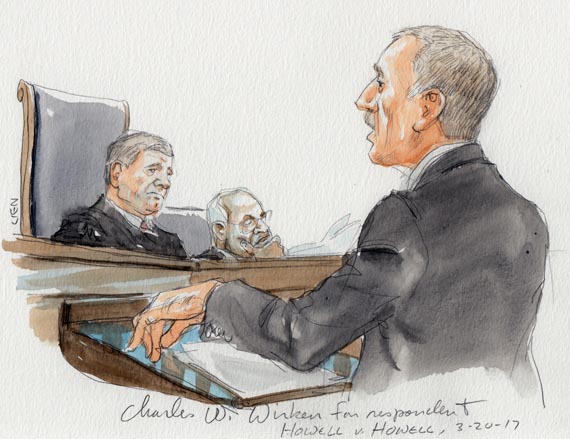Argument analysis: Quiet bench means few signals on military divorce case

on Mar 20, 2017 at 9:36 pm
We often refer to the Supreme Court as a “hot bench”: Questions fly fast and furious from all the justices, often allowing the lawyers to get out only a few sentences (if that many) before fielding the next question. However, the bench that heard today’s oral argument in Howell v. Howell, a dispute over military retirement pay in a divorce, was more lukewarm than hot. Advocates for both sides had plenty of extended opportunities to speak – so much so that Adam Unikowsky, representing petitioner John Howell, only used a little more than half of his allotted 30 minutes during the main part of his argument. The relatively sparse questioning from the justices was no doubt welcomed by the advocates, but it made it much harder to predict how the justices might ultimately resolve the case.
The question before the court hinges on the interpretation of the Uniformed Services Former Spouses’ Protection Act, a 1982 federal law that authorizes state courts to divide up military retirement pay in a divorce. The law allows state courts to treat “disposable retired pay” as either the service member’s property or the property of both the service member and the member’s spouse, depending on state law. The term “disposable retired pay” is in turn defined as the service member’s retired pay, minus any portion of that pay waived in favor of disability benefits.
The dispute in this case arose in 2005, 14 years after John and Sandra Howell divorced. The former spouses agreed that Sandra would receive half of John’s military retirement pay when it began the following year. But John later opted to waive part of his retirement pay to receive disability benefits (which, unlike retirement pay, are not taxable) instead. That decision meant that Sandra received $125 less per month than she had previously received, while John actually got more money — both the additional money that would otherwise have gone to Sandra and the savings from his disability benefits being tax-free. Sandra went to court, asking to have her monthly payments restored to the amount that she had received before John’s waiver and to be reimbursed for the amount she believed that she was owed for the lower payments in the past. The Arizona Supreme Court agreed with her, and the Supreme Court agreed last fall to weigh in.
At today’s oral argument, Unikowsky argued that the USFSPA bars state courts from ordering him to pay Sandra half of the portion of his retirement pay that he now receives as disability pay. This position is not only consistent with the text of the USFSPA, he contended, but also makes sense in light of the purpose of the law. Congress would have wanted veterans to keep their disability pay, he emphasized, because they are the ones who are disabled, and because the disability pay is intended to substitute for money that the veteran is no longer able to earn. That goal of protecting a veteran’s disability, he continued, is not related to whether the veteran becomes entitled to disability pay before or after the divorce.

Adam G. Unikowsky for petitioner (Art Lien)
But not all of the justices agreed with Unikowsky – most notably, Justices Sonia Sotomayor and Ruth Bader Ginsburg. Both justices seemed to believe that, despite Unikowsky’s assurances to the contrary, the timing of the disability benefits does matter. First, Sotomayor posited, the divorce agreement gave Sandra a property right in half of John’s retirement pay; when he opted to waive some of that pay in favor of disability benefits, she contended, he was effectively impinging on Sandra’s property right. Second, she suggested, when a couple gets a divorce after one spouse has opted to receive disability benefits, they have a full picture of their finances: They know that they can’t divide the disability benefits, but courts can compensate for the disability benefits in other ways – for example, by increasing child support or alimony. Here, Sotomayor complained, Sandra planned her life around receiving half of John’s full retirement pay, but he unilaterally decided to waive some of the pay. In cases like these, Ginsburg maintained, courts should be able to re-open divorce agreements to account for the changed circumstances.
Arguing on behalf of Sandra Howell, lawyer Charles Wirken told the court that a ruling for John would in fact be at odds with the purpose of the USFSPA. Congress could not have intended, he argued, to allow service members to agree, as part of their divorce, to divide up retirement pay but then apply for disability benefits and waive part of that pay, leaving their former spouses in the cold. But Chief Justice John Roberts was dubious, telling Wirken that the purpose of a particular law isn’t always going to resolve all of the questions about its interpretation. And that’s particularly true here, he noted, because Congress also wanted to preserve disability benefits for veterans.

Charles W. Wirken for respondent (Art Lien)
Roberts became even more skeptical when Ilana Eisenstein, the assistant to the U.S. solicitor general who argued on behalf of the federal government in support of Sandra, told the justices that there are “many economically equivalent ways” that a court can effectively reach the same result without expressly dividing up a veteran’s disability pay. Roberts retorted, spiritedly, that Eisenstein was essentially saying that there is “no real substance to this law.” All a court needs to do, he stressed, is to “find some charade to get to the same result.” If you have a law that bars courts from dividing up disability pay, but allows them to award money from another source to compensate for the inability to divide disability pay, he concluded, “that’s the sort of thing that gives law a bad name.”
Although Roberts, Ginsburg and Sotomayor all seemed to telegraph their views on the case, the other justices were harder to read. During his rebuttal, Unikowsky assured the justices that waivers of military retirement pay in favor of disability benefits are not rare, but in fact happen all of the time. So no matter how the justices ultimately rule, their decision will likely have a significant impact on divorcing military couples.


